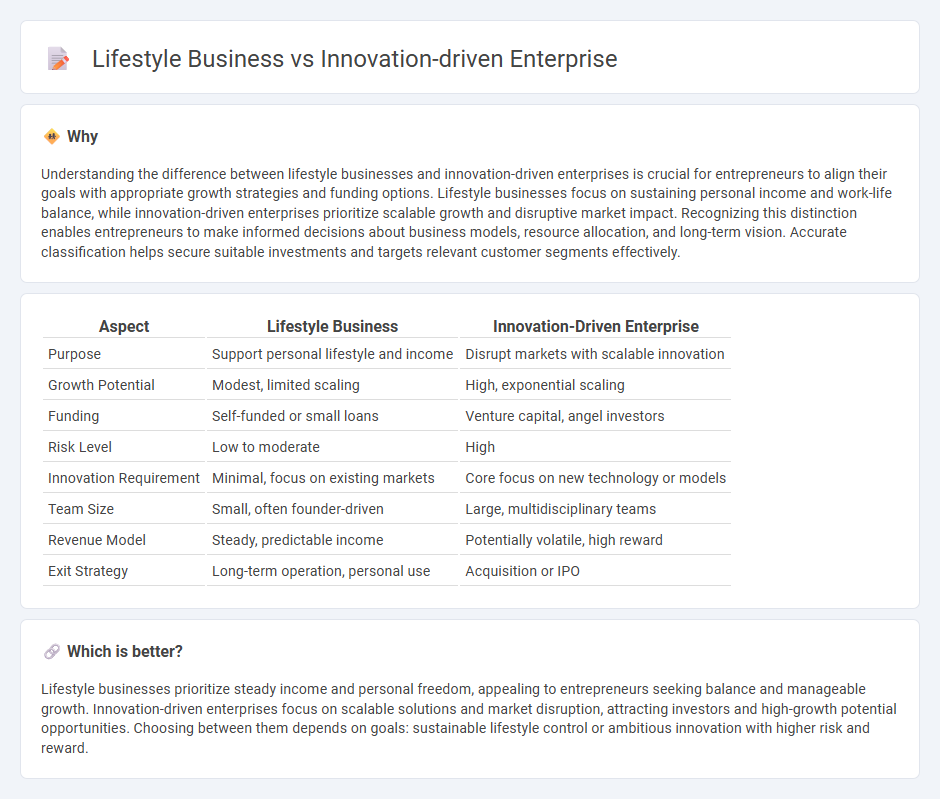
Lifestyle businesses prioritize personal freedom and steady income, focusing on sustaining a comfortable way of living. Innovation-driven enterprises aim for rapid growth and market disruption through groundbreaking technologies or business models. Explore deeper to understand which entrepreneurial path aligns with your goals.
Why it is important
Understanding the difference between lifestyle businesses and innovation-driven enterprises is crucial for entrepreneurs to align their goals with appropriate growth strategies and funding options. Lifestyle businesses focus on sustaining personal income and work-life balance, while innovation-driven enterprises prioritize scalable growth and disruptive market impact. Recognizing this distinction enables entrepreneurs to make informed decisions about business models, resource allocation, and long-term vision. Accurate classification helps secure suitable investments and targets relevant customer segments effectively.
Comparison Table
| Aspect | Lifestyle Business | Innovation-Driven Enterprise |
|---|---|---|
| Purpose | Support personal lifestyle and income | Disrupt markets with scalable innovation |
| Growth Potential | Modest, limited scaling | High, exponential scaling |
| Funding | Self-funded or small loans | Venture capital, angel investors |
| Risk Level | Low to moderate | High |
| Innovation Requirement | Minimal, focus on existing markets | Core focus on new technology or models |
| Team Size | Small, often founder-driven | Large, multidisciplinary teams |
| Revenue Model | Steady, predictable income | Potentially volatile, high reward |
| Exit Strategy | Long-term operation, personal use | Acquisition or IPO |
Which is better?
Lifestyle businesses prioritize steady income and personal freedom, appealing to entrepreneurs seeking balance and manageable growth. Innovation-driven enterprises focus on scalable solutions and market disruption, attracting investors and high-growth potential opportunities. Choosing between them depends on goals: sustainable lifestyle control or ambitious innovation with higher risk and reward.
Connection
Lifestyle businesses prioritize personal passion and steady income, while innovation-driven enterprises focus on scaling disruptive ideas and attracting venture capital. Both models contribute to economic growth by creating diverse job opportunities and fostering creativity within various market niches. Understanding their connection highlights the balance between sustainable entrepreneurship and high-impact innovation.
Key Terms
Scalability
Innovation-driven enterprises emphasize rapid scalability through disruptive technologies and market expansion strategies, aiming for significant growth and high valuation. Lifestyle businesses prioritize manageable growth, often focusing on steady cash flow and personal fulfillment rather than aggressive market capture. Explore how scalability impacts long-term success in both business models to make informed strategic decisions.
Growth Orientation
Innovation-driven enterprises prioritize rapid growth through disruptive technologies and scalable business models, attracting significant investment and market share expansion. Lifestyle businesses emphasize steady, manageable income streams aligned with personal or family goals rather than aggressive scaling. Explore the key distinctions in growth orientation to determine which business approach aligns best with your objectives.
Personal Goals
Innovation-driven enterprises prioritize scalable growth, market disruption, and long-term value creation by leveraging cutting-edge technologies and strategic investments. Lifestyle businesses emphasize personal goals such as work-life balance, financial independence, and sustainable income with minimal risk, often targeting niche markets or local customers. Explore more to understand which business model aligns best with your personal aspirations and economic objectives.
Source and External Links
What is innovation-driven entrepreneurship (IDE)? - Innovation-driven enterprises pursue opportunities focused on innovative products or services targeting super regional or global markets, characterized by scalable jobs, diverse ownership, and potential for exponential growth beyond local markets.
Innovation Driven Entrepreneurship - IDEs are startups that create new innovations with clear competitive advantages and high growth potential, focusing on global markets, scalability, and often involving external capital for rapid expansion rather than linear growth.
Innovation-Driven Entrepreneurship | NBER - Innovation-driven entrepreneurship is distinguished by high-growth startups that contribute significantly to economic growth, highlighting the importance of innovation-based firms over general entrepreneurship for driving economic progress.
 dowidth.com
dowidth.com